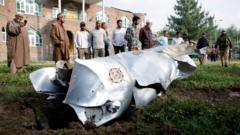In a definitive statement, Hamas leader Khalil al-Hayya conveyed their unwillingness to endorse partial agreements, emphasizing the need for a resolution that involves the release of all hostages alongside Palestinian prisoners.
Hamas Dismisses Israeli Ceasefire Proposal, Calls for Hostage Negotiation

Hamas Dismisses Israeli Ceasefire Proposal, Calls for Hostage Negotiation
Hamas has outrightly rejected Israel's ceasefire proposal, demanding a comprehensive deal centered on hostage exchanges and an end to the ongoing violence.
Israel's ongoing military operations have led to significant casualties, with reports detailing at least 37 fatalities among displaced civilians in Gaza.
Hamas has formally turned down Israel's recent ceasefire offer, calling instead for negotiations to secure the release of all 59 hostages still held captive in exchange for an end to hostilities and the liberation of Palestinian inmates. Khalil al-Hayya, the group's chief negotiator, criticized the proposal, asserting that it merely served the political agenda of Israeli Prime Minister Benjamin Netanyahu, noting, "We will not accept partial deals."
The recent Israeli offer proposed a 45-day ceasefire in exchange for ten hostages' release; however, Hamas has indicated a refusal to accept this strategy, which they argue continues to exacerbate the violent conflict that erupted following Hamas's attack on Israeli border communities on October 7, resulting in the deaths of around 1,200 people and the kidnapping of 251 individuals.
As airstrikes by Israeli forces continue, causing daily casualties among Gazans, the humanitarian crisis in the region has reached alarming levels. An attack in a tented area for displaced civilians resulted in at least 37 deaths, according to the Hamas-run civil defense agency. Witness accounts describe horrifying scenes where flames engulfed tents due to "powerful" explosions.
While Israel maintains that its military operations target Hamas strongholds and deny a humanitarian crisis, organizations focused on humanitarian aid have raised serious concerns. The heads of twelve significant aid groups commented that Gaza's aid infrastructure is collapsing under the pressure of the ongoing conflict. Israel stands firm in its intention to enforce a blockade until all hostages are returned.
As the conflict escalates, the repercussions continue to affect countless lives, with bodies piling up in hospitals and conditions worsening rapidly as the war's impact deepens further into the civilian populace.
Hamas has formally turned down Israel's recent ceasefire offer, calling instead for negotiations to secure the release of all 59 hostages still held captive in exchange for an end to hostilities and the liberation of Palestinian inmates. Khalil al-Hayya, the group's chief negotiator, criticized the proposal, asserting that it merely served the political agenda of Israeli Prime Minister Benjamin Netanyahu, noting, "We will not accept partial deals."
The recent Israeli offer proposed a 45-day ceasefire in exchange for ten hostages' release; however, Hamas has indicated a refusal to accept this strategy, which they argue continues to exacerbate the violent conflict that erupted following Hamas's attack on Israeli border communities on October 7, resulting in the deaths of around 1,200 people and the kidnapping of 251 individuals.
As airstrikes by Israeli forces continue, causing daily casualties among Gazans, the humanitarian crisis in the region has reached alarming levels. An attack in a tented area for displaced civilians resulted in at least 37 deaths, according to the Hamas-run civil defense agency. Witness accounts describe horrifying scenes where flames engulfed tents due to "powerful" explosions.
While Israel maintains that its military operations target Hamas strongholds and deny a humanitarian crisis, organizations focused on humanitarian aid have raised serious concerns. The heads of twelve significant aid groups commented that Gaza's aid infrastructure is collapsing under the pressure of the ongoing conflict. Israel stands firm in its intention to enforce a blockade until all hostages are returned.
As the conflict escalates, the repercussions continue to affect countless lives, with bodies piling up in hospitals and conditions worsening rapidly as the war's impact deepens further into the civilian populace.



















